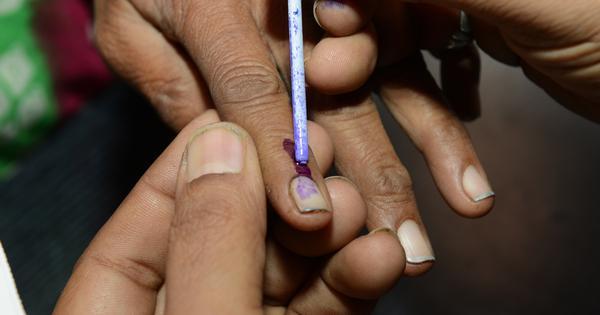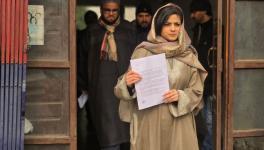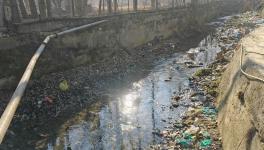Explained: The Importance of DDC Elections in J&K

Representational Image. Image Courtesy: AFP
Srinagar: The upcoming District Development Council (DDC) elections in the union territory of Jammu and Kashmir from November 28 will be its first major electoral exercise after the erstwhile state was bifurcated into two union territories with the abrogation of Article 370 on August 5, 2019.
When and Why?
Polling will commence on Saturday in both Kashmir and Jammu. The polling exercise will take place in eight phases and will end on December 19, with results to be declared by December 22.
Voting will take place between 7 am and 2 pm on scheduled days. This is the first time that elections in the region are open to non-state subjects like West Pakistan Refugees (WPR) after the abrogation of state-subject laws in the aftermath of the revocation of Articles 370 and 35 A.
Aimed at the revival of the Panchayati Raj system, the polls will be held on party basis. The Centre had approved amendments to The Jammu and Kashmir Panchayati Raj Act, 1989, earlier in October. It will pave the way for 280 directly-elected members in 20 districts of J&K, thus enabling the formation of all the three tiers of Panchayati Raj Institutions – Panchayat, Block Development Council (BDC) and DDC. The DDCs will be elected for a five year term.
The last general elections to the Panchayats were held in the months of November and December in 2018 and 22,214 panches and 3,459 sarpanches were elected out of 33,592 panch and 4,290 sarpanch constituencies in the UT.
Further vacancies have accumulated on account of deaths and resignations by elected panches and sarpanches. Also, as a result of the election of the chairperson of BDC in October 2019, another 307 seats of panches or sarpanches had fallen vacant. The bye-elections to the vacant seats and as many as 228 vacant seats in the Urban Local Bodies (ULBs) would be held simultaneously.
Polling Mechanism
The polling will take place through ballot boxes while there will be postal ballots for COVID-19 patients or those in isolation, senior citizens and those who are physically unwell.
According to an official notification, Section 45 of the Jammu and Kashmir Panchayati Raj Act, 1989 “envisages a District Development Council, for each District having jurisdiction excluding areas of the district which are included in a municipality or municipal corporation.”
Administrative Changes
Set to become a new layer of governance in the UT, the DDCs will oversee the functioning of Halqa Panchayats and block development councils. The DDCs, which are expected to prepare and approve district plans and capital expenditures, will replaces the District Planning and Development Boards in all districts across the region.
Earlier, the District Development Boards looked after the planning, approval or implementation of centrally sponsored schemes. The board functioned under an elected MP, MLA and an MLC and the deputy commissioner and was headed by a cabinet minister. Under the new system, the DDCs will be headed by a chairman from an elected representative.
Each DDC will have 14 directly-elected members and five standing committees will be constituted for finance, development, public works, health and education and welfare.
The Political Backdrop
Mainstream political parties, including the Jammu and Kashmir Peoples Democratic Party (PDP), the National Conference, Jammu and Kashmir People's Conference (PC) and the Congress party are contesting the polls as a united front against the BJP and its allies in the region. Regional parties like the NC and PDP had earlier boycotted the BDC polls in the wake of the abrogation of Article 370. The parties formed the People’s Alliance for the Gupkar Declaration (PAGD) to counter the BJP and its alliance in the region while demanding the restoration of the pre-August 5 status for J&K.
The PAGD includes the Farooq Abdullah led NC, Mehbooba Mufti-led PDP, Sajad Lone’s (PC), the Awami National Conference (ANC), Jammu Kashmir People’s Movement (JKPM), the Congress party and the CPI (M). The Jammu Kashmir Pradesh Congress Committee (JKPCC), which was among the first signatories of the PAGD, has since distanced itself from the alliance.
The PAGD decided to contest the DDC election despite its rejection of the Centre’s abrogation move and the subsequent introduction of new laws, which they see as a move to disempower the people of the region. The two fronts, one led by the PAGD and the other by the BJP, are locked in a tough fight with candidates on both sides contesting all the 280 seats.
As soon as the DDC polls were announced, they were engulfed in controversies with political opponents making serious allegations against each other.
Earlier last week, Union Home Minister Amit Shah called the PAGD a “gang”, which, he claimed, had set out to bring back an era of “turmoil” in the Valley, a charge that invoked a sharp response from J&K’s mainstream parties.
Ahead of the DDC polls, the PAGD parties and its leaders have also been thrown another challenge in the form of the Rs 25,000 crore ‘Roshni Act fraud’. The Act, brought by the NC government in 2001 to regularise occupied or encroached land property in the region with compensation and fund power projects, has been declared null and void.
Authorities in the UT have now made public a list of influential beneficiaries of the Roshni Act which includes businessmen, bureaucrats and politicians. In another list of persons charged with encroachment of state land, many other politicians, including the PAGD president Farooq Abdullah, have also been named.
Leaders of political parties, including leaders Omar Abdullah and Mehbooba Mufti, have also levelled charges that some PAGD candidates were held against their will in secure locations and kept from campaigning, a charge denied by the election commission.
Just days before the DDC elections and a day after filing his nomination for the DDC elections from his Pulwama home constituency, PDPs Waheed ur Rehman Para was summoned to the National Investigation Agency (NIA) headquarters and arrested in a militancy related case in which disgraced J&K police officer Davinder Singh was accused of aiding militants.
The DDC polls are also being held amid the fears of disruption by militant groups. Even as the state election commission have increased the security cover to deal with the concerns and provide security to the contesting candidates, holding polls in volatile districts of south Kashmir remains a challenge.
Get the latest reports & analysis with people's perspective on Protests, movements & deep analytical videos, discussions of the current affairs in your Telegram app. Subscribe to NewsClick's Telegram channel & get Real-Time updates on stories, as they get published on our website.
























